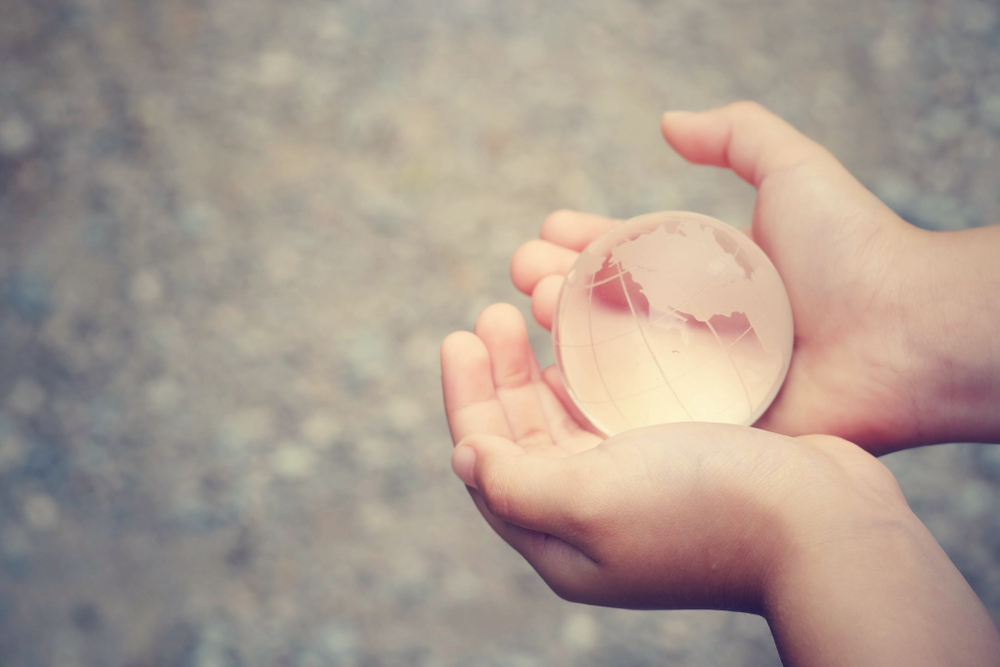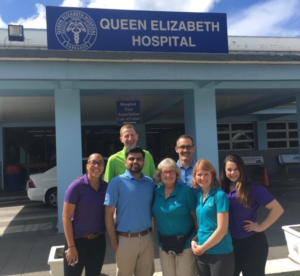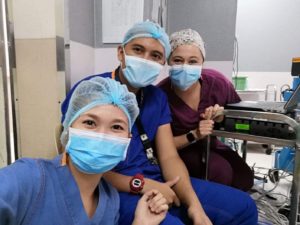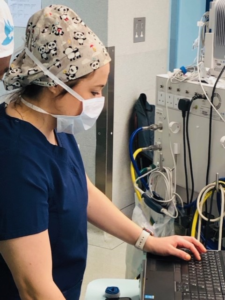
When I joined SpecialtyCare and graduated from the SNI training program, I was excited to enter the field of neuromonitoring because I knew I’d be doing unique and enthralling work. But I never would have imagined the amazing opportunities it would offer me. This past October, I completed my third scoliosis medical mission trip. Let me tell you, these trips are more than traveling or building your resume – they are absolutely life-changing in so many ways.
Changing Lives

Kim Hall (far right) and surgical team
The common and accurate sentiment behind these trips is the impact you will have on many children’s lives. With each trip, our team was able to perform scoliosis correction surgery on anywhere between 6-9 children who wouldn’t normally have the access or ability to receive this surgery for many reasons, especially not with the safety and guidance of IONM. The trip begins with a clinic prior to the operation days, where operative candidates are greeted and evaluated. We also may see post-op patients from previous trips or possible future candidates. We were able to meet many children and their families, each so grateful, offering endless smiles and hugs even in the face of uncertain circumstances or obstacles.
If you are lucky enough to go on repeat trips, you may even get to see the patients you performed surgery on previously. They will come running up to you taller, happier, and healthier than the last visit, challenging you to hold back tears of joy and gratitude. These brave young humans and their families will express so much gratitude to you, probably never realizing how much they have impacted your life as well and that they deserve the same thanks in return!
This October was my second trip to Queen Elizabeth Hospital in Barbados, so I was able to see some of our patients from last year! There was one young man who was a bit nervous before and after his surgery, understandably so. His surgery went great and he was feeling good when we went to see him post-op, however, he was too nervous to move much or get up and walk around (which is important for these patients to do). By the second postoperative day, we had him walking up and down the hallway and posing for a picture with us. He was smiling ear-to-ear (and even laughing!). That made our hearts so happy. Well, that same patient came in for a follow up this year, and wouldn’t you know it, he was showing us his DANCE videos! And he is quite talented! Thanks to his surgery, he’s able to do something he’s passionate about. It was a phenomenal thing to see, and it’s just one of the stories I could tell from our patients.
It Doesn’t Take a Team. It Takes an Army.

 This success doesn’t just happen with your own team; it takes an army. The team we travel with generally consists of one or two surgeons, one or two medical implant representatives, an IONM clinician, and a nurse. As you arrive at your designated clinic or hospital, you are greeted by surgeons, residents, nurse anesthetists, nurses, scrub techs, foundation staff, and more. The teamwork begins immediately with everyone working toward a common goal and it is an astonishing thing to be a part of.
This success doesn’t just happen with your own team; it takes an army. The team we travel with generally consists of one or two surgeons, one or two medical implant representatives, an IONM clinician, and a nurse. As you arrive at your designated clinic or hospital, you are greeted by surgeons, residents, nurse anesthetists, nurses, scrub techs, foundation staff, and more. The teamwork begins immediately with everyone working toward a common goal and it is an astonishing thing to be a part of.
Your role as an IONM clinician is huge, as many places don’t know much about neuromonitoring or its requirements. You will be both and a teacher and a student. There are many challenges to face that won’t be overcome without unreserved teamwork, and every role is important. By the end of a week of many long hours overcoming challenges together, gaining respect for each other, teaching each other, stressing, laughing, and probably dining together, these teammates become family. There’s no way around it, and it’s a beautiful thing. I have made meaningful connections and friends in other countries with whom I continue to keep in contact with.
The Blessings We Take for Granted
 As you step into the OR in your day to day routine, do you consider how blessed you are in all aspects of your career? There’s rarely a second thought given to the abundance of resources we have access to. Implants, supplies, medications, facilities, staff, and even neuromonitoring itself. The lack of access to these things in other countries is what began these trips and is something to keep in mind. It’s so easy to get burned out in medicine, but these trips offer so much to every person involved. You will sharpen your skills, communication, and teamwork. You will have the opportunity to be both a teacher and a student. You will get to experience another culture and different perspectives. You will gain a family. You will be humbled and more grateful for small things you may have never thought about. And finally, you will help change the lives of these children and their families, and every person involved in this trip will change yours. It may just be one of the most meaningful things you do, and I am so grateful for these experiences.
As you step into the OR in your day to day routine, do you consider how blessed you are in all aspects of your career? There’s rarely a second thought given to the abundance of resources we have access to. Implants, supplies, medications, facilities, staff, and even neuromonitoring itself. The lack of access to these things in other countries is what began these trips and is something to keep in mind. It’s so easy to get burned out in medicine, but these trips offer so much to every person involved. You will sharpen your skills, communication, and teamwork. You will have the opportunity to be both a teacher and a student. You will get to experience another culture and different perspectives. You will gain a family. You will be humbled and more grateful for small things you may have never thought about. And finally, you will help change the lives of these children and their families, and every person involved in this trip will change yours. It may just be one of the most meaningful things you do, and I am so grateful for these experiences.
Kimberly Hall, B.S., CNIM, is a Surgical Neurophysiologist II and Northern VA and D.C. IONM Team Lead
Comments are closed.